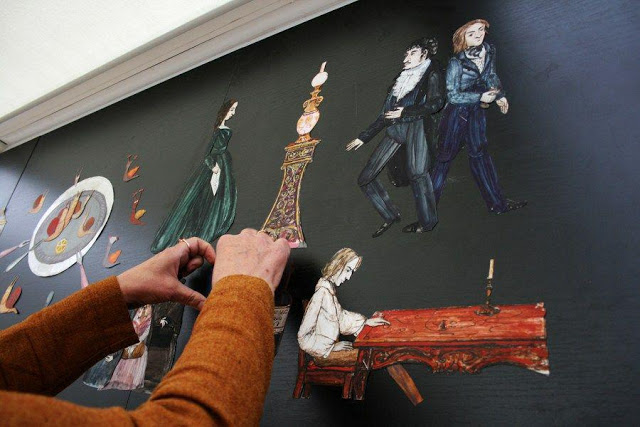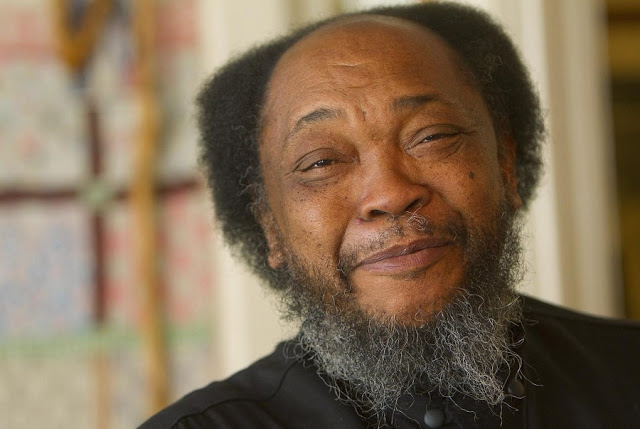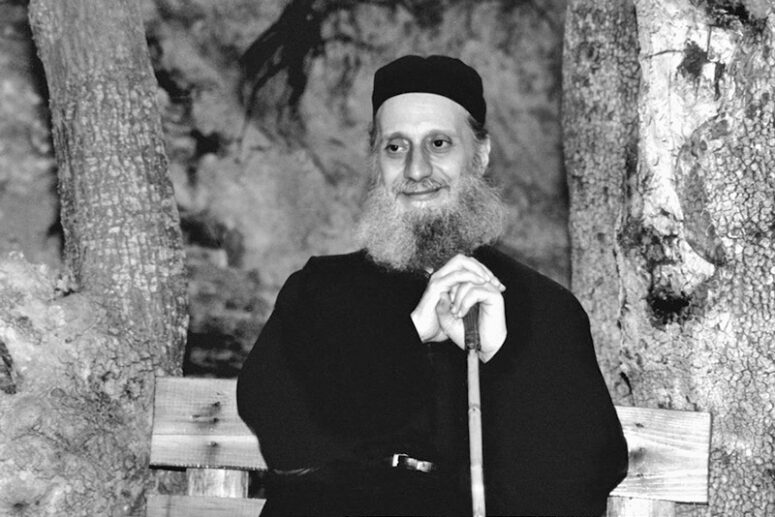
Schema-Archimandrite Aimilianos (Vafidis), a great elder of our time, was born on October 5 in 1934. In his memory, we are publishing a talk given before the Elder’s repose by his spiritual son, the confessor of the Convent of the Transfiguration of the Lord in France, Archimandrite Iliya.
***
King Solomon addressed his inspired, prophetic prayer to the Wisdom of God, that is, to the incarnate Word of God, to Christ, and asked God for wisdom and cried out: For what man is he that can know the counsel of God? or who can think what the will of the Lord is? (Wis. 9:13). Such people are few. They come along once or twice a century. I would like to remember such a man today.
Elder Aimilianos and the Philokalia
I want to tell you about one of those who preserved the tradition of the Philokalia and passed it on to us—Archimandrite Aimilianos, the abbot of Simonopetra Monastery on Mt. Athos. Elder Aimilianos deserves to be included in the list of fathers whose works are found in the Philokalia. His “Word on Prayer,” included in the book The Authentic Seal, will one day be found next to the texts of Sts. Callistus and Ignatius Xanthopoulos, Peter of Damascus, and Symeon the New Theologian. But the time has not yet come for the works of Elder Aimilianos to be widely known. It takes effort to understand his teaching, and that’s very difficult for people in our times. Nevertheless, his teaching is accessible, and Geronda has shown us this.
We need only to strive resolutely for God, and not saturate our minds with various television shows, electronic games, and various drugs, physical and psychological, that lead the soul away from the meaning of its existence—from unity with God and abiding in God!
The Elder’s books are a light for all who approach them with a heart that thirsts for God. His books do not entertain, but place us directly before God, revealing to us who we are and who He is: His magnificence and our poverty. The Elder’s books open our eyes to ourselves and at the same time, reveal to us He Who is invisibly present among us. The author calls us to be like the Savior, in the words of the apostle Paul: But we all, with open face beholding as in a glass the glory of the Lord, are changed into the same image from glory to glory, even as by the Spirit of the Lord (2 Cor. 3:18).
So you who love Beauty—and the word “philokalia” means “love of beauty”—can see in Elder Aimilianos one of the reflections of this Beauty. Indeed, all that we have seen in him and heard from him is the fruit of his personal communication with God.
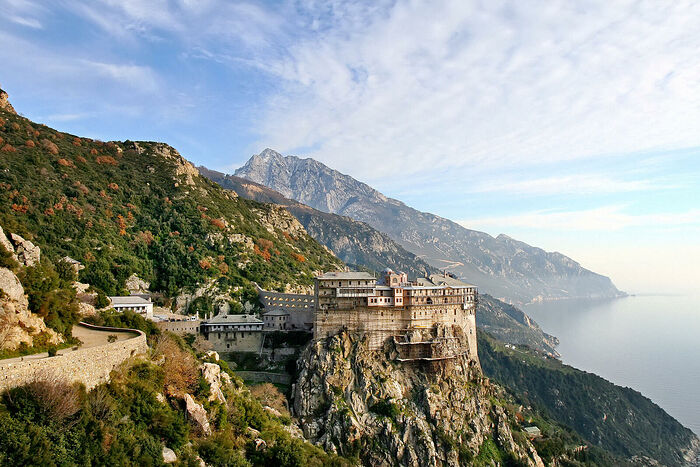
The mystical experience of Elder Aimilianos
When the Elder was still a young priest in the monastery near Trikala, one night he was praying to St. Vissarion when God appeared to him. You could say that he witnessed the Transfiguration—he was covered with the same radiant cloud that descended on the three disciples who were with Christ and also on the holy prophets Moses and Elijah.
How many saints has Fr. Aimilianos seen? No one will ever know, because the Elder never speaks about his personal experience. Nevertheless, we can learn a little bit about these encounters by gathering various pieces of proof. The holy apostle Paul, St. John Chrysostom, and St. Mary Magdalene are the names I have personally heard about.
The Elder’s liturgical experience
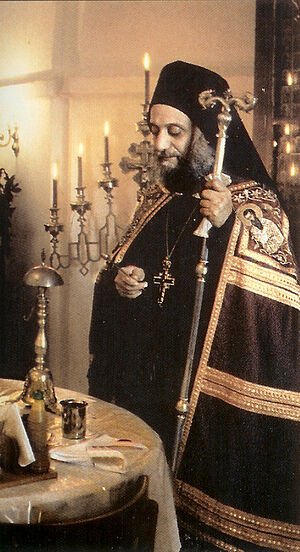 All of his disciples know that he witnessed the great Cappadocian hierarchs celebrating Liturgy in his grandparents’ house. Can you imagine? St. John Chrysostom, St. Basil, and St. Gregory concelebrating in a private house! And this wasn’t somewhere in the Middle Ages, but in the middle of the twentieth century! Do you understand that it’s impossible not to have a special faith in such a person?!
All of his disciples know that he witnessed the great Cappadocian hierarchs celebrating Liturgy in his grandparents’ house. Can you imagine? St. John Chrysostom, St. Basil, and St. Gregory concelebrating in a private house! And this wasn’t somewhere in the Middle Ages, but in the middle of the twentieth century! Do you understand that it’s impossible not to have a special faith in such a person?!
Not only did we know that he is a man of God, but we understood that everything he said to us—whether in personal conversation or during a talk with the brothers—was a word spoken with authority. The Elder did not teach like people who speak about what they learned from others or read in books, but always said what he himself learned from God, or what was revealed to him by the saints. He especially loved the holy apostle Paul, and you could put the apostle’s words in his mouth: Eye hath not seen, nor ear heard, neither have entered into the heart of man, the things which God hath prepared for them that love Him. But God hath revealed them unto us by His Spirit (1 Cor. 2:9-10).
We were all deeply impressed by how the Elder served the Divine Liturgy. His attention was focused to the extreme, and we felt that he was somewhere beyond this world. He fixed his gaze on nothing earthly but was completely focused on God. Concelebrating the Liturgy with the Elder meant witnessing a genuine transfiguration. Although the spiritual reality was closed to us, it was still obvious to us that he was with the angels and nothing could disturb him.
I remember seeing him in the Church of St. George in Constantinople, concelebrating with the Patriarch, the Metropolitan, and the bishops. They were all of highly noble appearance, but he radiated a special glow, and his movements resembled the liturgical movements of the angels. It was something like what we see in the frescoes of the Liturgy of the angels. Just as the angels bring vestments to the throne of the Lord of Glory for the celebration of the Liturgy, Geronda held the aer or omophorion the same way.
Without a doubt, the Liturgy was a special place for Elder Aimilianos to meet God. And during the Liturgy, the Lord would inform him of what he needed to know. We would sometimes see how the Elder, awaiting the end of the antiphons or some hymn, before giving the exclamation, would be writing something in a small notebook that he always carried with him.
Elder Aimilianos and the revival of Athonite monasticism
Closely connected with the name of Archimandrite Aimilianos, an extraordinary follower of the “philokalic” tradition, is the revival of monastic activity on the Holy Mountain in the last quarter of the twentieth century. This revival was expressed in the flourishing of the interrupted hesychastic tradition, which until then had been preserved and handed down only in particular Athonite monasteries and kallyvas. Life in these kallyvas was truly sublime.
I remember how several other monks and I saw a monk in the Kallyva of St. Basil running from his cell to the chapel calling: “Papou! Papou!”—an affectionate term for an elder. Seeing that we had arrived, the monk ran to the chapel to say: “Papou, Papou, rejoice—some monks have come to see you!” And when we entered the chapel after him, this “Papou” was indeed waiting for us… resting in his reliquary for two or three hundred years already! But for this monk, he was still alive! That’s how deep and close their spiritual connection was! And don’t think this is all a figment of an inflamed imagination! Absolutely not! This is communion with the saints through faith. Such is our mutual closeness: Time or death separate us no more than distance!
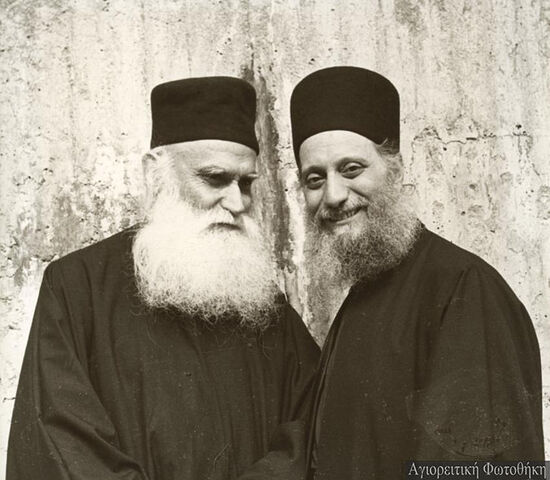
At the extreme southern end of the Athonite peninsula, in the part called the “desert,” lived the kalogeri, which can be translated as the “beautiful, noble elders.” They lived in strict asceticism, in unceasing prayer, according to the teaching known to us from the Philokalia. Among them, the most famous are St. Joseph and his disciples who became the abbots of large monasteries. We knew one of Elder Joseph’s disciples well—Papa Ephraim of Katounakia. He played a significant role in the life of Elder Aimilianos. I was present at one of their last meetings.
Fr. Aimilianos had spent more than an hour climbing the steep ascent from the pier to Papa Ephraim’s kallyva and was exhausted. Elder Ephraim was already practically blind then, but when they both realized they were approaching one another, they put on their riassas and, refusing any help or support, ran with outstretched arms to meet one another. And Papa Ephraim shouted: “Amen, amen, blessed is he that comes in the name of the Lord!” Both of them were beaming with a joy that was transmitted to everyone around them. It was truly a holy meeting of two brilliant luminaries!
In the 1970s, several Athonite monasteries began to flourish at about the same time. Many monasteries began to leave the idiorhythmic life and return to traditional coenobitism. In Iveron, Fr. Vasileios shone forth, and not far from Stavronikita Monastery lived the hermit Fr. Paisios, recently glorified among the saints.
At that same time, Elder Aimilianos came to Simonopetra with the community that had gathered around him in Meteora Monastery. The young brotherhood adopted the Athonite tradition and charter thanks to the elders living in Simonopetra who were strict guardians of the charter. The presence of such a charismatic personality like Elder Aimilianos enriched and transformed this tradition. You should have seen how these elders departed from this life! One of them, Fr. Gelasius, who had been bedridden for two months, suddenly got up one day and went to call the others to Vespers. Having struck the semantron the last time, he lay back down on his bed and fell into eternal sleep. Was this not a beautiful farewell to the brethren?
The spiritual revival of the Holy Mountain has continued since then. Elder Aimilianos made his own contribution to it, and not a small one. It seems, as Papa Ephraim said, that a “golden age” has come to the Holy Mountain now.
The ever-radiant Elder Aimilianos
Who was not captivated by the Elder’s kind smile that never left his lips? It was not a forced smile, but a natural one, coming from inner joy, from the joy of meeting another person. His eyes pierced right through your soul, letting you know that he saw everything, understood everything, and that he knew your path.
The Elder never received anyone formally, but from his whole heart. Meeting someone took him away from prayer, but he never allowed himself to show a shadow of fatigue, and all his attention was focused only on you. He would turn off the phone, close the door, and listen to you, look at you, and give you time to calm down, so your heart would gradually open up.
He would always offer a refreshing drink and treat you to some sweets, but he wouldn’t eat himself, but only ask you about your worries, your family, your needs, and gradually gain your full confidence, although he didn’t impose himself on you at all. He greatly valued the freedom of every person. He never interfered in someone’s life if they didn’t ask about it themselves. He never gave the same advice to his spiritual children, but would look at what each one could and wanted to give to God according to their own measure. The Elder was attentive to the providence of God for each person, to everyone’s personal calling.
His spiritual beauty especially shone during the Divine Liturgy. Everything was simple, without any affects in his voice or sentimentality, but the strength and intensity of his prayer was felt in the rhythm of the words he spoke, in their music, and in the beauty of his movements, which were not ordinary, but symbolic. But the power of his prayer was mainly expressed in his gaze. He never took his eyes off of the One Whom he served, and those with whom he was concelebrating, that is, the angels. He stood before the Unseen and gazed upon Him. I think the Jews saw Moses on Sinai the same way, when he came down from the holy mountain, radiating.
Elder Aimilianos as a witness of the presence of God
The Elder’s teaching expressed the depth of his spiritual experiences and a vivid sense of the presence of God. He always emphasized that faith consists not only in a simple confession of the existence of God, but in believing, knowing, feeling, and seeing that God is continuously working in the world, in history, in the Church, and in people’s lives.
I was lucky enough to accompany the Elder on several of his trips to parishes and dioceses where he held talks. The people who heard him were delighted and astonished. How many people experienced an internal upheaval thanks to his words! He spoke not as a man who knew the holy fathers and great theologians, but he spoke with authority, that is, with complete knowledge of the matter. He spoke from his own experience, which he tried to convey to others.
To prepare a word of instruction, he would pray all night, and in the morning make only brief notes which he would then use to speak to his audience. This is how his talks came about—an expression of his experience inspired by the Holy Spirit.
The Elder taught us to sense the action of God in history. I remember how he wept among the ruins of the Studion Monastery in Constantinople, which gave the world a great multitude of saints.
I thought the Elder was seized by grief over the destruction of the whole world, and I couldn’t resist asking him about it. But I was wrong! “No!” he said to me. “Don’t you realize that the generations of monks who lived here are still alive?! Don’t you feel that we are in unity with them here and now?! The rocks lying here still sing the glory of the Lord and will do so to the end of time! This is what touches me and pleases me to the depths of my soul!” I saw the same joy shining on his face in the Church of Agia Sophia in Nicaea, where the Fathers once gathered and, inspired by the Holy Spirit, expressed the Christian faith in dogmas.
Elder Amilianos and the meaning of the Church
“Ecclesial gathering” is an expression often found in the Elder’s talks. An “Ecclesial gathering” is not simply a gathering of believers united by one ideal or even a common faith! It is the experience of deep, intimate communication between people gathered in the name of Christ, Who is found among them. And when the Lord is among two or three who are gathered in His name, He is not the third or the fourth who simply makes the group larger, but He is truly embodied in this congregation, and this congregation is the Body of Christ—the Head of which is Jesus, and we are its members—which is called the Church.
And in speaking of Elder Aimilianos, we are speaking precisely about a man of the Church. First of all, he is a monk, dedicated to God since childhood, and like the apostle Paul, he desired that all might be like him, that all might know the same blessedness as him. It is no surprise that the Elder has more talks on monastic themes than on life in the world. The Elder would gather monks and nuns several times a week to encourage and instruct them, while he rarely in visited parishes, although several hundred people always gathered for his talks.
His instructions were absolutely astounding. I’ll give you just one quote so you can imagine what you can find in his talks:
A man who rejoices can instantly ascend to Heaven. But he who grieves, languishes, despairs, can neither pray nor remember Christ. Why do you exhaust your heart? How will you enter Paradise in such a state? Let us say “rejoice” to ourselves and others. And the more the things of this world change, the more joyful and peaceful we will be. Why? Because death is slain and Heaven is ours. Death has always been a problem for man. But death has been swallowed up, and now we can march to eternal life with joy and peace, together with the Church. Prayer will help us in this.
The temptations we face in life will strengthen our faith. Sorrows and difficulties are our plea bargain.1 We give a few farthings, that is, we labor, we wear ourselves out, we endure trouble, we suffer infirmities—and we receive millions in return. Thus, our life turns into unspeakable joy.
The humility of Elder Aimilianos
In one talk, the Elder said that a spiritual man can be recognized by the fact that he never speaks about himself and is not occupied with himself but always recedes into the background, giving way to others. This is called humility. The Elder himself never spoke about his spiritual experiences as his own, but spoke about them as if someone else had experienced them. Thus, for example, we received evidence that he never sinned voluntarily, by conscious choice. However, this didn’t prevent him from feeling unity with the sinners we are. When we confessed our personal sins, the Elder did not have any leniency about them, sometimes even showing extreme strictness. But at the same time, he would also say: “We’re all sinners.” And with the word “all,” he implied a full consciousness of the closest connection by which we are ontologically united with each other, such that the experience of some people, good or bad, is shared by others.
Thus, the saints bear our sins, of which they are not guilty and bear no responsibility, and conversely, their holiness also becomes ours, like the holiness of Christ, the only Holy One. Otherwise, we could not be members of His Body.
The gift of speech
One of Elder Aimilianos’ gifts strikes me most of all—his ability to express the greatest mysteries in simple words, suitable to our age and our perception. Moreover, the Elder presented these mysteries to us not so we would understand them logically, but in order to initiate us into them, help us penetrate into them, make them accessible to us, that is, arouse in us a desire to partake of them. In his talks, he always shows us the world transfigured, but accessible. At the same time, it takes effort on our part to enter into it. The Elder explains to us what we need to do. He teaches us to change, to be transfigured, and shows us our role in this transfiguration. He puts high demands on us that squeeze our ego and compel us to renounce comfort and rest. That is, he speaks in details about things that seem superhuman to us, sluggish and inert beings, but thanks to his instructions, they become accessible.
Vigil and fasting, struggling with the most secret thoughts, evasion and aversion from sin, resisting temptations, preparing for the Liturgy and Communion—this is what the Elder teaches us. Of course, some of his teachings seem terribly strict. But the Elder doesn’t call us to Old Testament practices, but to be today, in our age, disciples of the Living and Resurrected Christ, Who sits at the right hand of the Father in the company of the angels. By “Old Testament practice,” I mean any ritualistic, legalistic, or formal understanding of the Church. No, with the Elder we went to church not because the law or any rules of decorum required it, not because the Church is the bearer of Sacred Tradition, but because our secret, living and life-creating, personal and communal meeting with our living, loving and adoring, majestic and humble God is to be found there. Otherwise, we don’t understand why we go to church!
Elder Aimilianos’ activity now
Elder Aimilianos has been sick for twenty years now. He is bedridden, and he doesn’t seem to react to the outside world. The Elder, so radiant, so needed by people, weakened very quickly. It is noteworthy that he was aware of the path that would lead him to the Cross, but he never parted with his smile, with his absolute submission to the will of God: no regret, no anxiety, no worry, no complaints, just manifestly “sorrowful” joy.
With his life, Divine holiness, zeal, inspiring teaching, compassion, and great love, the Elder became completely like unto Christ. We could all say: Did not our heart burn within us, while he talked with us by the way, and while he opened to us the scriptures? (Lk. 24:32). If being a Christian means having the same mind … which was also in Christ Jesus (Phil. 2:5), the same spiritual disposition, then Elder Aimilianos sets a perfect example for us.
However, has his work ended with his illness? Of course not! I was told that when the Elder’s long agony had just begun, he said: “Now I begin my work.” This was said by a man who had already done so much! And he said it when he seemed to have fallen into complete inactivity!
Conclusion
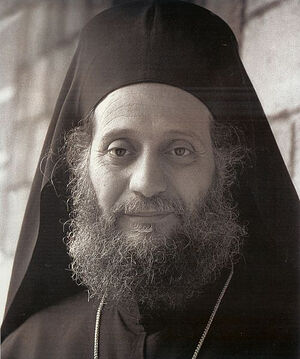 As a conclusion, I offer the central idea of the testament left to us by Archimandrite Aimilianos:
As a conclusion, I offer the central idea of the testament left to us by Archimandrite Aimilianos:
St. John Chrysostom says in his catechetical homily on Pascha that we are all called to the Kingdom of God. Both the first and the second enter into the bridal chamber of Christ. Are you first? Are you second? Are you the millionth? Call on the name of the Lord with faith, and you will immediately understand that you are also called to the Kingdom of God. We are all children of God.
To the apostles, saints, and all Christians, the Lord says: Rejoice, because your names are written in Heaven. The angels and archangels are written in Heaven, and so are we. The Lord is waiting for us to enter into His joy. The first, the second, the third—let us all confess God with our joy and become the praise of our Church, as if we are all apostles and myrrh-bearers, and above all, fervent worshipers of Jesus Christ, that we might feel Paschal joy every day.
With this joy I leave you and fervently desire for you the words of the apostle Paul: My brothers, rejoice; be ye joyful, and rejoice with me; Rejoice in the Lord always (Phil. 4:4).


